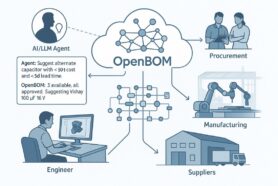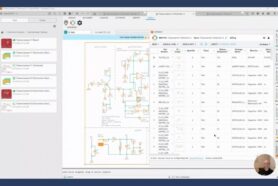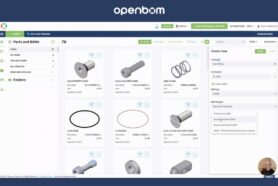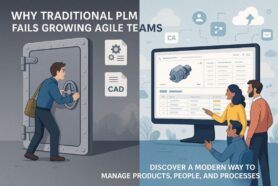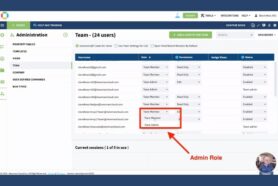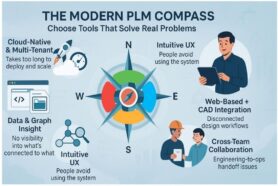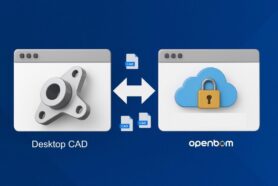
Implementing PLM traditionally was known as a very complex task that required a lot of planning work and/or skills. PLM tech and platforms are notoriously famous for their complexity, and people need to be brought in with “skills” to implement them.
At OpenBOM, our vision is to simplify the complexity of PLM by providing an easy and streamlined way and experience to help manufacturers and engineering teams get up to speed in a much easier way. While we admire simplicity, we need to learn how to make things simple, but not simpler. Some of these things can be easily simplified, but some of them require planning and organization.
OpenBOM in your company is a transformative step toward streamlining your product lifecycle management (PLM), CAD file management, bill of materials (BOM), and change management (CM) processes. To ensure a successful implementation, it’s crucial to create the right balance between strategic planning, agile implementation, and organizational feedback.
In my article today, I want to help you understand and guide you with the strategy to craft this right balance. It includes technical, organizational, training, and adoption questions.
In general, there are 3 phases in your implementation: (1) Strategic planning; (2) Initial adoption; and (3) Improvement and expansion. For some of these tasks you need to hire an external consultant and some of them must be done by an internal team.
Essential Skills for Implementing OpenBOM
As much as OpenBOM sounds and smells like “a simple tool”, you don’t need to underestimate the complexity of your organization, the nature of product data, and changes. Therefore you need both IT, product development, and people management skills.
1. IT Project Management
- Coordination and Planning: Strong organizational skills are essential to plan the implementation timeline, allocate resources, and set milestones.
- Risk Management: Identifying potential challenges and developing mitigation strategies is crucial for a smooth implementation.
- Communication: Ensuring clear communication between stakeholders, including executives, IT, and end-users, is key to aligning expectations and progress.
2. Technical Proficiency
- System Integration: Knowledge of integrating OpenBOM with existing systems such as CAD, ERP, and PLM is vital. This includes understanding APIs, data migration, and synchronization.
- IT Infrastructure: A solid understanding of your company’s IT infrastructure helps assess compatibility and prepare the environment for OpenBOM deployment.
- Troubleshooting: Technical team members should be adept at identifying and resolving any technical issues that may arise during implementation.
3. Data Management
- Data Migration: Skills in defining data models, transformation, and loading data are necessary to transfer existing data into OpenBOM accurately.
- Data Cleansing: Ensuring data accuracy and consistency is critical. This includes removing duplicates, correcting errors, and standardizing data formats.
- Data Modeling: Understanding how to structure data within OpenBOM to reflect your company’s products and processes is essential for effective use.
4. Change Management
- Training and Support: Implementing new software involves training users. Effective trainers are needed to educate staff on how to use OpenBOM’s features and best practices.
- User Adoption: Encouraging and managing user adoption is crucial. Change management specialists can help address resistance and foster a culture open to new processes.
- Continuous Improvement: Post-implementation support to address user feedback and continuously improve the system’s usage and integration.
5. Engineering and Manufacturing Knowledge
- Product Knowledge: Understanding the specifics of your company’s products and the associated BOMs ensures accurate setup and usage of OpenBOM.
- Process Optimization: Knowledge of manufacturing and engineering processes helps configure OpenBOM to align with and enhance these workflows.
- Quality Assurance: Ensuring that the BOMs and related data are accurate and complete and that the implementation supports compliance and quality standards.
6. Leadership and Vision
- Strategic Thinking: Leaders must align the implementation with the company’s strategic goals, ensuring that OpenBOM supports broader business objectives.
- Decision Making: Effective decision-making skills are needed to resolve conflicts, allocate resources, and prioritize tasks during the implementation process.
- Inspiration and Motivation: Inspiring the team and maintaining high morale throughout the implementation phase is key to overcoming challenges and achieving success.
When should you hire PLM Consulting and/or Services?
This is the question every company asks itself when starting an implementation process. Should we do it with “in-house” skills or hire someone who “did it already”? While it is hard to find a silver bullet, you might consider this task too.
1. Lack of In-House Expertise
Make a realistic assessment of your capability to understand how to map your organizational strategy to OpenBOM capabilities. If your team lacks specific expertise in PLM or OpenBOM, we can help you by providing support and/or get the right partner to help you. From my perspective, buy knowledge, but not time.
2. Complex Integrations
There is no PLM without integrations. While many people are afraid of integrations, OpenBOM offers a simple and easy way to get it done. For complex integrations involving multiple systems (CAD, ERP, PLM), professional services can help streamline the process and ensure seamless connectivity. Check first OpenBOM resources online for integrations and best practices.
3. Accelerating Implementation
Time is essential. Consultants can expedite the implementation process by bringing in proven methodologies and best practices. However, you need to be sure that as a company, you have an alignment about implementation strategy. Otherwise, partners will bring you the wrong resA
4. Change Management
This is not a typical PLM topic, but it is important not to miss that because wrong change management can damage other implementation processes, and lead to unsuccessful implementation and overall company organizational performance.
When significant organizational change is required, external experts can help manage the transition, train employees, and drive user adoption effectively.
5. Continuous Improvement
OpenBOM and PLM implementation is not a single event. It requires improvement over time as your company is learning more and getting into the process of planning the next steps in your PLM adoption. It is a journey and OpenBOM will help you to move up.
Conclusion
You need to prepare yourself to implement OpenBOM. Even if it sounds simple, you need to get the right skills, preparation, planning, and organizational alignment. You need to have a person responsible for it with the leadership skills capable to align the organization and bring other people when needed for project management, technical skills, data management, change management, engineering, and manufacturing knowledge.
Knowing when to seek external consulting or services can improve your implementation process, ensuring success and maximizing the benefits of OpenBOM for your organization.
Looking at how to implement PLM? Talk to us directly today.
Best, Oleg
Join our newsletter to receive a weekly portion of news, articles, and tips about OpenBOM and our community.




